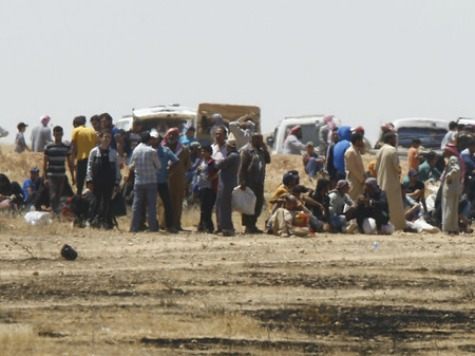Turkey is temporarily closing at least one of its borders to Syrian refugees after accepting 1.8 million Syrian nationals fleeing the ongoing civil war there. Turkey’s deputy prime minister stated the decision was based on the fact that “there is no longer a humanitarian tragedy” on the other side of the border, though a change in that status would once again open the border.
“We’ll wait for them to go safe areas in their region,” Deputy Prime Minister Numan Kurtulmuş said, emphasizing that closing the border at Akçakale was not a change in Turkish policy, but a sign that it was no longer necessary to help Syrians near that border escape any imminent danger. He credited both “fleeing strikes by coalition forces and the progress of Kurdish fighters in the region” for diminishing the threat in that particular reason, though other border crossings may remain open.
Despite the alleged drop in need to help fleeing Syrians, the number of refugees flooding the Turkish border has not gone down. The Turkish foreign ministry reported that, between June 3 and 11, 13,434 refugees crossed the border into Turkey. Of these, according to the Agence France-Presse, 6,600 arrived between Wednesday and early Friday. The numbers became an occasion for Kurtulmuş to protest that Europe is not taking in a sufficiently large number of Syrian refugees, leaving the burden on Turkey. “These states mobilise when just five refugees arrive at their borders but continue to be mere spectators at the efforts employed by Turkey,” he said.
This is not the first time Turkey has warned it would close its borders to Syria. In March, Turkey closed two of its border crossings in Oncupinar and Cilvegozu in response to increased violence on the other side of the border. Turkey at that point was allegedly sending humanitarian aid into Syria, but not letting refugees cross into the country and blamed “intelligence pointing to a terrorist plot orchestrated by the government of Syria’s president, Bashar al-Assad” for the decision. The New York Times quoted one Turkish official as saying, “We aren’t talking about a threat from one or two people here. We have received solid intelligence about a large-scale terrorist attack, and therefore must take the necessary precautions.”
That border closing, like the one this week, was the exception to the rule of allowing Syrians to enter Turkish with few restrictions for most of the civil war beginning in 2012. This week, the United Nations Refugee Agency (UNHCR) praised Turkey as a model for other nations being flooded with displaced persons to follow. “The UNHCR has never seen a country in the middle of crisis adopting a law managing asylum and migration. There is no other country. Turkey is the first one,” said UNHCR head Karim Atassi.
While Turkey has kept a large number of the nearly two million refugees who have flooded it from the east, thousands are attempting to leave Turkey for the European Union and are causing a crisis in neighboring Greece. The Greek coast guard has described its fleet as “overwhelmed” and “paralyzed” by the high number of refugee vessels attempting and succeeding in landing at Kos, Lesbos, and other Greek holiday islands. They have also called Turkey’s efforts at restricting refugees from taking to the sea “disappointing.”
Between Tuesday night and Wednesday morning, Greece took in 407 migrants, nearly all landing on islands that depend heavily on tourism and have seen their economies threatened by European tourists refusing to visit and have to see streets lined with homeless Syrian refugees. The economic damage migrants are causing stands in stark contrast to predictions as recently as March that the Greek islands would have a successful summer season due to a devalued euro allowing more tourists to purchase vacation packages.

COMMENTS
Please let us know if you're having issues with commenting.